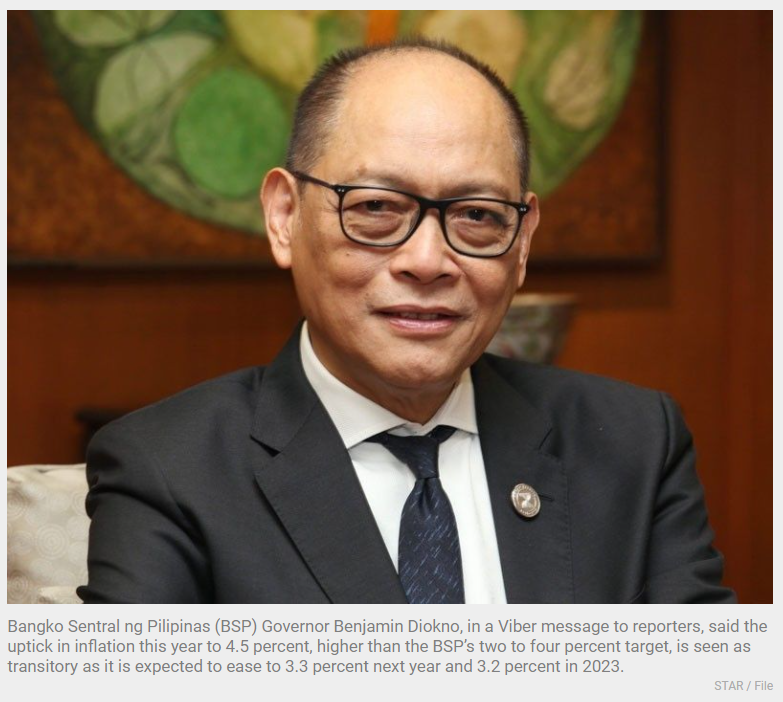Philippines: BSP not keen on rate hike
MANILA, Philippines — Raising interest too soon due to increasing inflation pressures is seen to do more harm than good, according to Bangko Sentral ng Pilipinas (BSP) Governor Benjamin Diokno.
Diokno, in a Viber message to reporters, said the uptick in inflation this year to 4.5 percent, higher than the BSP’s two to four percent target, is seen as transitory as it is expected to ease to 3.3 percent next year and 3.2 percent in 2023.
Inflation averaged 4.5 percent from January to September after slightly easing to 4.8 percent last month from a 32-month high of 4.9 percent in August.
As a result of increasing inflation pressures, Diokno said a number of central banks in the world have started to raise interest rates.
“Many have decided to wait. To me, the harm of tightening monetary policy too soon exceeds the harm of moving too late, given that the Philippine economy is at its nascent state of economic recovery,” he said.
The BSP Monetary Board has kept interest rates at record lows for seven straight rate-setting meetings since November last year to allow economic recovery to gain more traction.
As part of its COVID-19 measures, the central bank slashed interest rates by 200 basis points, lowered the reserve requirement ratio, extended recurring P540-billion provision advance to the national government and purchased government securities in the secondary market, among others. These initiatives unleashed P2.3 trillion into the financial system.
“In any event, based on the evidence at the time of its decision, the Monetary Board will decide on the appropriate timing of its policy change. It won’t be influenced by opinion makers, market analysts or Twitters,” the BSP chief said.
Diokno said major upside risks in the remaining months include the potential impact of weather disturbances on the prices of key food items, the rise in world commodity prices due to strong demand versus supply chain bottlenecks, and the possibility of a prolonged African swine fever (ASF) outbreak.
On the other hand, he said the main sources of downside risks are the prolonged impact of derailed domestic economic growth due to delays in the easing of lockdown measures, and the weaker-than-expected global recovery owing to the rapid spread of the more infectious Delta variant.
Diokno pointed out that core inflation, which excludes selected volatile food and energy items underlying demand side pressures, was at 3.3 percent in September this year.
He said the number of consumer price index (CPI) items at the sub-classes levels with inflation rates above the threshold of four percent was 49 items out of 239, while 54 items were within the two to four percent target.
Likewise, Diokno said 136 items were below the BSP target.
The BSP chief noted there is no pressure on the demand side, such as increases in wages, transport costs, and housing, while there is sufficient slack in the economy, and real estate prices are steady with downward bias.
“Since the inflation pressures are coming from the supply side, there appears to be no justification for monetary intervention,” he said.
The remaining rate-setting meetings of the Monetary Board are scheduled on Nov. 11 and Dec. 16.
Economic managers see the country’s gross domestic product (GDP) growing by four to five percent this year, and seven to nine percent next year. The Philippines exited the pandemic-induced recession that stretched five quarters with a GDP growth of 11.8 percent in the second quarter from a contraction of 3.9 percent in the first quarter.
Source: https://www.philstar.com/business/2021/10/18/2134809/bsp-not-keen-rate-hike


 English
English




